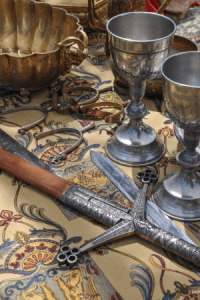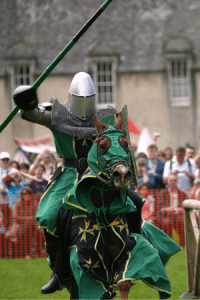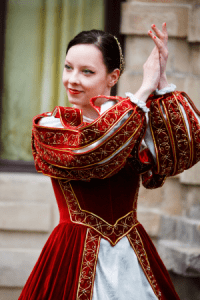
Escape to the Renaissance
From mid-August to September, get your joust on in Holly, Michigan.
The Michigan Renaissance Festival is held each summer near Holly, Michigan on weekends from mid-August through September. Going in costume is encouraged, but not required, and the entertainment and activities can be enjoyed by everyone, rain or shine.

Calling all jugglers, knights, Vikings and wizards!
If you go, you will see much, much more than just a ye olde affaire. Each week has a different theme and special events to enjoy.
Open-air happenings include musicians, magicians, jugglers and armored jousting competitions. Renaissance period crafts will be demonstrated, as well as made available for sale, along with “traditional” food and drinks such as huge roasted turkey legs and hearty stew served in a bread bowl.
You can also see dragons, mermaids, people dressed like Frodo, eat freeze-dried candy, and try on every available color of sparkly elf ears.
Unlike Greenfield Village, Old Sturbridge Village or Civil War reenactment groups, renaissance fairs are typically not focused on historical accuracy. The point isn’t for attendees to match the event’s production value as much as to match its enthusiasm for a different, wilder, more fanciful world.
It is a place where cottagecore, fairycore, knightcore, steampunk, LOTR fanatics, D&D dungeon masters, people who forge their own chainmail on the weekends and people who like fantasy in general can all get sunburned and muddy together while listening to lutes and sea chanties.
Other important tidbits to know before you go can be found here.

But what was the Renaissance really?
The European Renaissance was a period of rapid change from roughly the 14th to 17th century. It is considered a cultural “rebirth” following the Middle Ages and Black Death, prompted by the rediscovery of classical Greek literature, histories and oratorical text—which was likely fostered by a wave of immigration into Europe by Greek scholars after the fall of Constantinople.
Greek ideas, initially considered a sign of sophistication during the Roman Empire, were eventually driven out of Europe by the rise of Christianity; Greek continued to be studied, however, in the eastern half of the empire.
Some elements of Greek thought spread more deeply into Asia and Africa, were transformed and ultimately returned to Europe through Iberia and Sicily, most notably by the Toledo School of Translators. Though largely unplanned and disorganized, this interplay between ancient Europe and the Arab west constituted one of the greatest cultural transmissions of ideas in history.
The Renaissance saw the invention of the printing press, the “discovery” by Europeans of North and South America, the introduction of oil paint and canvas and the revolutionary idea that Earth is not the center of the universe. It also saw the development of the scientific method, focusing on empirical evidence and the importance of mathematics, which has influenced every aspect of modern life.
Learn more about the Renaissance in the 940.21s.

How did we get from that to this?
Renaissance fairs in the United States started due to a resurgence in interest in medieval and Renaissance culture following the end of World War II.
While early fairs had a strong focus on historical accuracy/education and were often set up by historical museums and societies to portray life in a 16th-century village as accurately as possible, others began incorporating more entertainment and fantasy elements depending on the interests of their communities.
These days, fairs blend fun and education, appealing to many demographics to attract larger crowds. Most still have character actors, presenters and even vendors remain “in character” throughout, and although guests are not required to participate at this level, they are always encouraged to take part if they want to.
Have you always wanted to be a publican or townsperson in a ye olde town and get paid to wear a costume? You’ve missed your chance this year, but keep an eye on their website for auditions, which are typically held in early May.
Save Money on Your Next Visit
Heading out to the Renaissance Fair this year? Save a couple of bucks with your Canton Public Library card, courtesy of the Michigan Activity Pass program. Here's how:
- Head to the Ticket page on the Michigan Renaissance Fair website.
- Click "Purchase Tickets."
- Choose the Corporate Online Consignment Program ticket option.
- Select the number of tickets you want from the dropdown menu and enter Corp2025 in the promotion code field.
- Follow the rest of the prompts to purchase your tickets.
Enjoy your visit!


Add a comment to: Huzzah! All About the Michigan Renaissance Festival